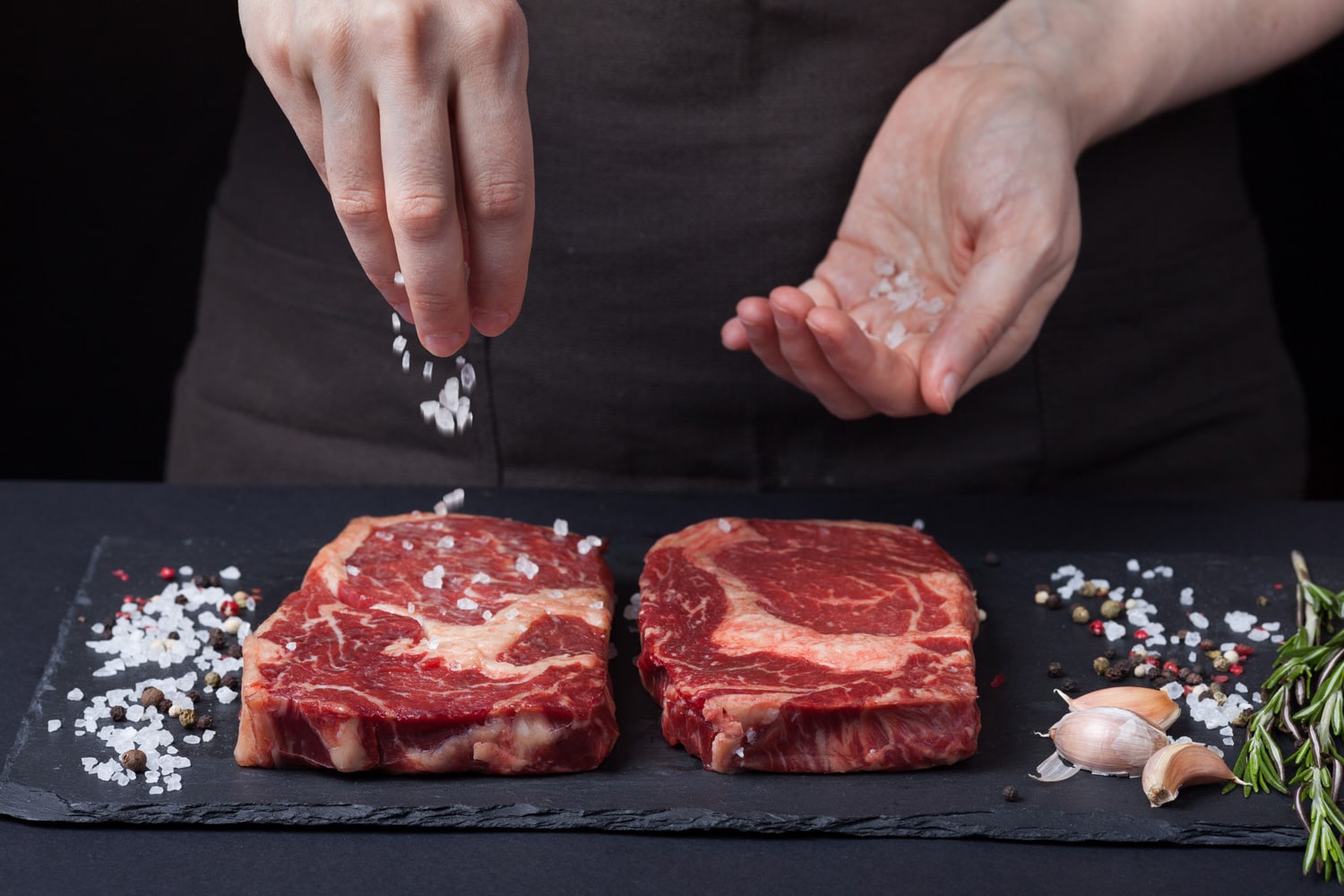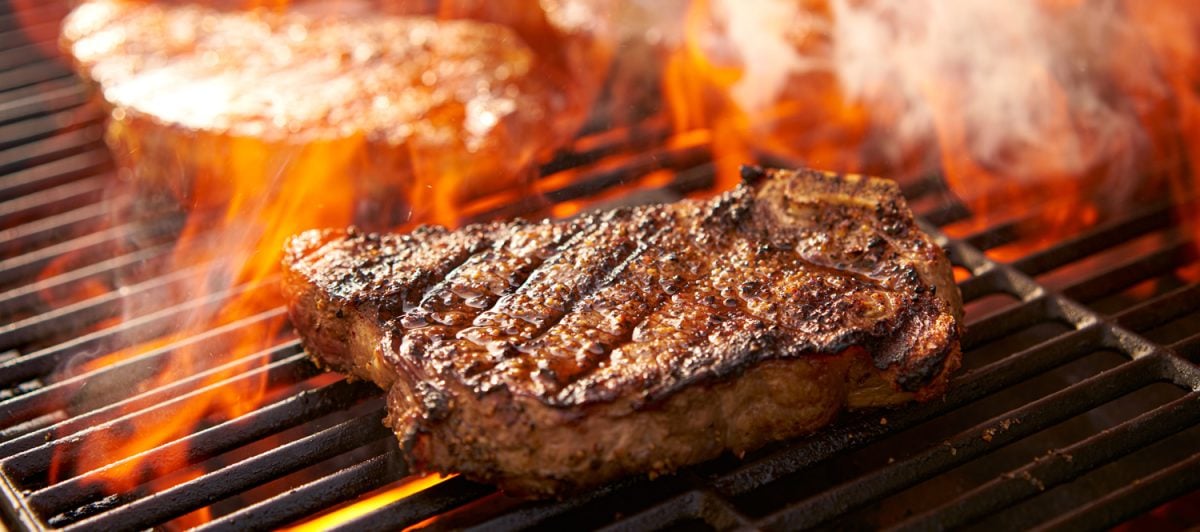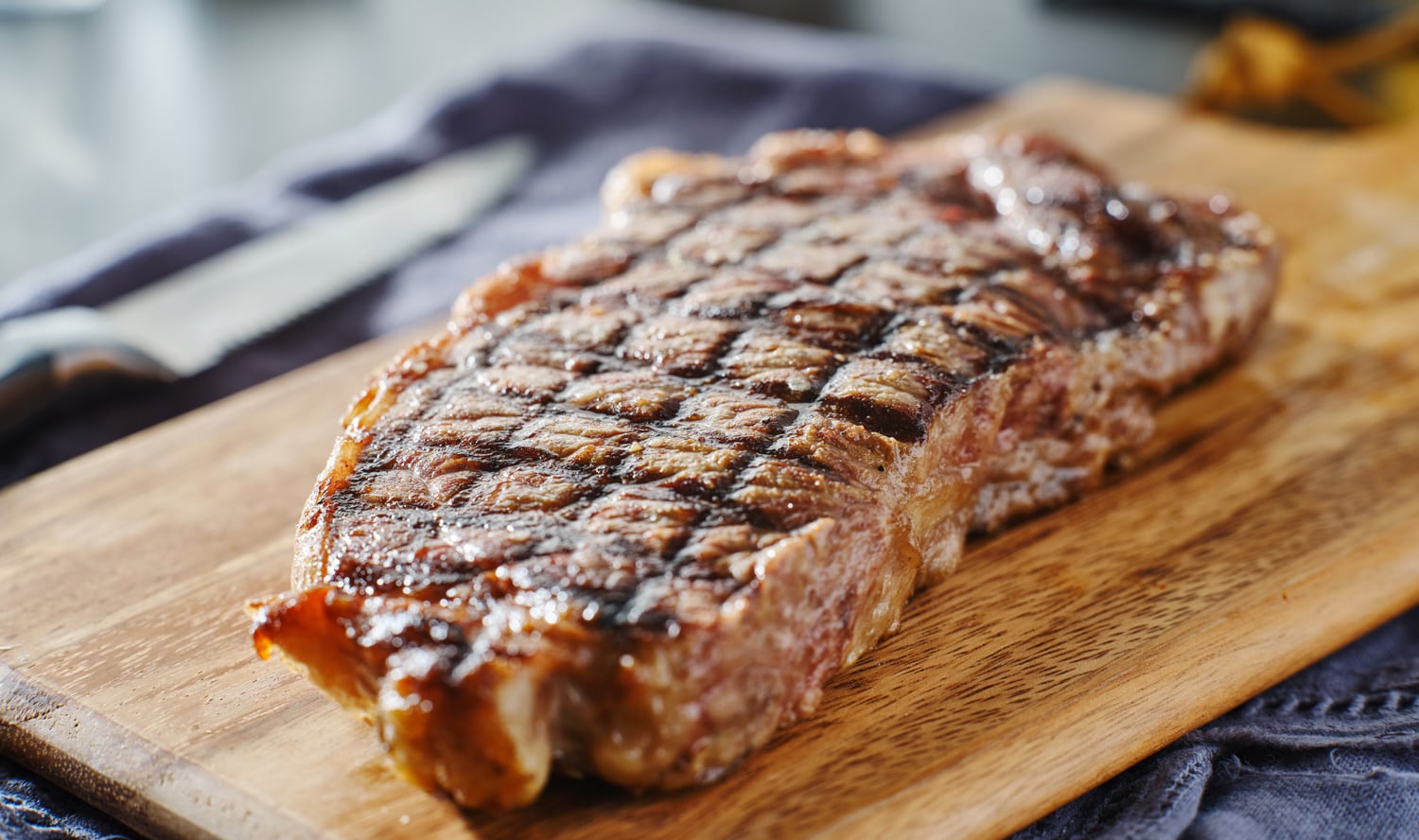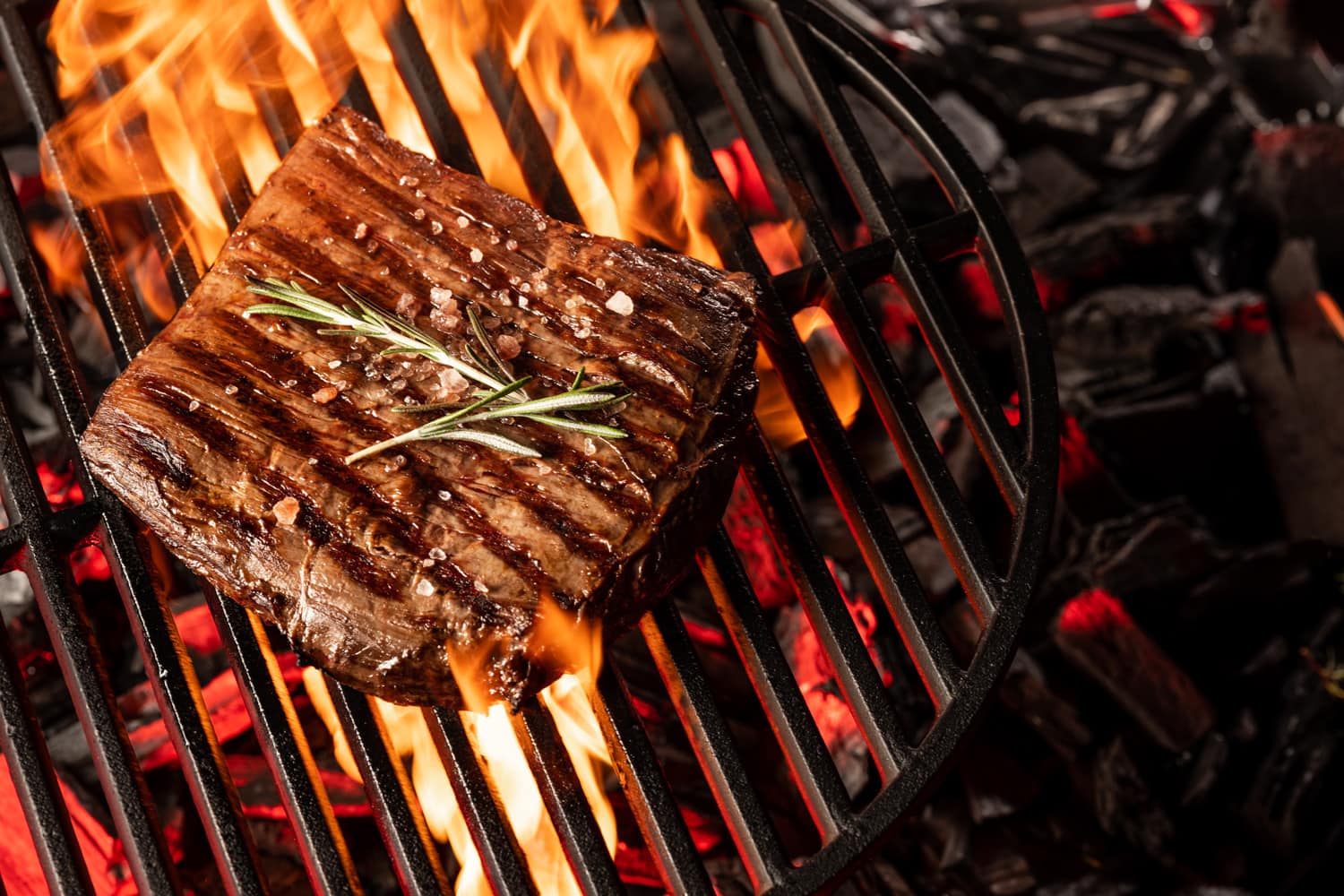Everyone loves a perfectly cooked steak. And it's no mystery that there are countless ways to prepare and cook that perfect fillet or ribeye. But one thing you might be wondering is whether you should rinse the salt off steak prior to cooking it. We did the research to bring you the answer.
You do not have to rinse the salt off a steak before you cook it. In most cases, you should not rinse meat. Salting your steak before you cook it will make it more tender.
If you still have some questions about salting steak, don't worry. In this post, we'll discuss the topic in more detail. We'll also talk about how to make a salt brine, whether or not you should pat steak dry after salting it, and more. Without further ado, let's get into it.

What Does Salting Steak Do?
Ultimately, the point of salting steak is not only for flavor but also because the steak becomes more tender when it soaks in salt brine. The way it works is the salt makes it so the juices from inside of the steak are pulled to the outside of the steak. That liquid then mixes with the salt and soaks back into the steak.
By allowing a steak to have the time to go through this process, it becomes more flavorful. The steak will retain its juices as long as you give it enough time to absorb the salt. It is worth the time and effort if you are willing to try it.
If you are in a hurry, you can salt and season your steak right before you cook it. The reason it is best to do it beforehand is that doing so allows more time for the flavors to soak into the steak. Not letting a steak sit with salt and/or seasoning on it will make it so only the outside of the steak is flavorful.

How Do You Pre-Salt A Steak?
In order to salt a steak before cooking it, you start by spreading the salt around as evenly as you can on both sides. It is best to use kosher salt when you are salting a steak. Grab a wire rack to let your steak rest on until it is room temperature.
Click here to see this wire rack on Amazon.
You can pre-salt your steak by adding either a wet brine or a dry brine. The call is yours to make. A wet brine is a little messier.
A dry brine is ideal. Using a dry brine makes it so the salt is able to break down the tendons of the meat, which tenderizes it. Perhaps the best part is that the entire steak becomes more flavorful when you pre-salt it.
When you dry brine a steak, you should start by patting it dry on both sides of the steak. If you do not pat your steak dry before salting it then you will lose some of the salt as the juices leak out of the steak.
The best part about a dry brine is that you only leave it for 30 minutes rather than letting it soak in a wet salt brine.
If you use table salt, you do not need to use as much of it. You can use half as much as you do when using kosher salt. Kosher salt is the best choice.
How Much Should You Salt A Steak?
The answer to this question depends on how big your steak is. Ideally, you should end up with one fairly even layer of salt on both side of your steak. The thicker the steak, the more juices there are to be drawn out by the salt then soaked back in. A New York strip needs more salt than a thin ribeye.
On average, you should use approximately one teaspoon of salt for each pound of steak. This means you would use two teaspoons of salt for a two-pound steak. In that case, one teaspoon on each side.
Use less salt next time if you find that your steak was too salty for your liking. Your own preference can cause you to alter the amount of salt that you decide to use.
Wait To Cook Your Steak
Letting your steak come to room temperature is beneficial because your steak will cook more evenly. Give your steak at least 40 minutes to absorb the salt that you add. You can let it soak for between 40 minutes up to overnight. If you opt for the latter, be sure to keep the steak refrigerated during this time.
The reason it is important to let your steak come to room temperature is so that it cooks evenly and is not cold in the middle when it is done cooking. Ideally, the meat should be warm all the way through. That is, unless you prefer your steak to be rare.
You can cover your steak in foil while you let it rest. If you don't have foil, one option is to keep it in a skillet with a lid on it while it comes to room temperature.
When storing steak for longer than about 40 minutes, you should not keep it in foil. If you are storing your steak in the fridge, it should be covered in an air-tight container.
How Long Do You Salt Brine A Steak?
How long you salt brine a steak depends on the size of the steak as well as your personal preference when it comes to taste. The amount of time it takes to salt brine a steak is anywhere from one to 24 hours. But some people only give it 30 minutes before cooking.
Consider the size of your steak. If the steak is small, you do not have to salt it as much or for as much time. The thicker the steak, the longer it will take for the salt to be absorbed into the steak. A good rule of thumb is to salt brine a steak one hour for each inch in thickness.

If you do not soak it for long enough, then your steak will not have the chance to reabsorb the salt and juices. With this in mind, do not let your steak sit out in the open for too long because it will dry out.
You can actually salt brine your steak for up to 48 hours. Only do this if the meat is fresh when you salt it. The longer you salt it, the better it will turn out. Letting your steak sit in the salt brine overnight is still plenty of time if you do not want to wait the full 48 hours.
Do You Wash Steak After Salt Brine?
There is no need to wash the salt brine off your steak. It is not recommended to rinse meat in general, as there is no need to rinse the salt off.
Leaving the salt brine on your steak actually gives the outside edges that classic char you think of when you envision the perfect steak. The steak does not need to be dry before it hits the hot pan or grill that you are using.
Should I Pat Steak Dry After Salting?
You do not need to pat your steak dry after salting it. As long as you do not overdo it, it should not taste too salty once it is done cooking. The time when it is important to pat steak dry is before adding salt in the first place. Use a paper towel to pat your steak dry before salting.
Should You Oil Steak Before Seasoning?
Yes, you should use a small amount of olive oil on your steak before adding coarse salt. You only need enough olive oil to lightly coat the steak. A basting brush is handy for this job.
Click here to see this basting brush set on Amazon.
Adding oil to your steak helps the seasonings and/or salt stick to the steak better. This is not a necessary step, but it is a helpful one. You should use one teaspoon of extra virgin olive oil on each side of the steak.
Read more: What Oil Is Best For Grilling Steak?
Resting Steak

Remember to let your steak rest after you are done cooking it. Giving a steak the time to rest after it is done keeps the moisture inside the steak. It makes the steak juicier with flavor locked in.
Give your steak approximately five minutes to rest before cutting into it. Keep in mind steak continues to cook as it is resting.
With that said, you can pull a steak off of the heat source before it is cooked exactly the way you want it. For example, if you want a steak cooked to medium well, you should pull the steak off of the grill or skillet when it is closer medium.
Bringing It All Together

All in all, you should not need to rinse the excess salt off your steak before you cook it. The main reason to salt your steak is that it will be more tender. You should allow the water to be released then mixed with the salt and absorbed back into the steak.
Before you go, check out the following links related to cooking steak:
How Hot Should A Grill Be For Steak?
Should You Add Butter To Steak?






![A cook seasoning raw fillet mignon steaks, How Long Do You Rest Steak? [And Does It Keep Cooking When Resting?]](https://kitchenseer.com/wp-content/uploads/2021/04/A-cook-seasoning-raw-fillet-mignon-steaks-250x250.jpg)
![Raw organic marbled beef steaks with spices on a wooden cutting board on a black slate, stone or concrete background, Should You Always Marinate Steak? [Inc. 11 Awesome Steak Marinade Ideas]](https://kitchenseer.com/wp-content/uploads/2021/04/Raw-organic-marbled-beef-steaks-with-spices-on-a-wooden-cutting-board-on-a-black-slate-stone-or-concrete-backgroun-250x250.jpg)
